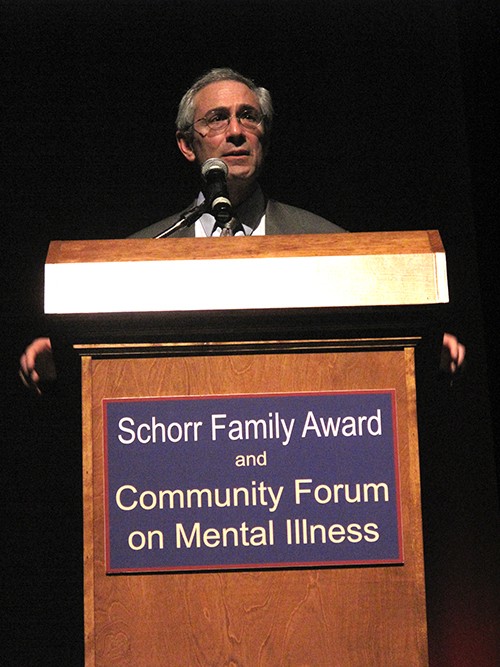Tucson seems different than other places recovering from tragedies more than three months after the Jan. 8 shooting, according to some mental health experts.
Dr. Thomas R. Insel, director of the National Institute of Mental Health, gave the keynote address at a mental health forum on Wednesday in Centennial Hall. The UA College of Medicine and other organizations held the event “”A Delicate Balance: Creating a Better Post-Jan. 8 System to Protect the Public and Help Persons with Serious Mental Illness.””
Several hundred people listened to speakers address the shooting, the state health care system for those with mental illnesses and the role the community plays in reducing the stigma around such diseases. The audience could also submit questions to be answered by the panelists during the event.
The event is normally held to give out the Schorr Family Award for Distinguished Contribution in Furthering Public Understanding of Mental Health and has occurred nearly annually since 1995. Insel still received the award, but this year’s event was extended to include a panel of experts to fulfill the need for community discussion after the shooting.
Incidents of senseless violence can define communities to outsiders, Insel said. Places such as Oklahoma City and Virginia Tech are still known by many as sites of massacres.
“”There are people around the nation and world who will equate the name Tucson with tragedy,”” he said.
Insel said Tucson may be on the right path on overcoming this image by promoting civility instead of pointing fingers. He commended the city’s increased dialogue about mental illness and the launching of the National Institute for Civil Discourse.
“”I was frankly inspired by the change in tone,”” Insel said. “”This will be a different place. This will be a different time.””
Panelist Joel Dvoskin, assistant clinical professor of psychiatry in the UA College of Medicine, said he has worked with other communities overcoming crisis. He said the initiatives of Tucsonans, specifically the families of victims, are atypical and inspiring.
“”What I often see is anger, cries for revenge and hatred,”” Dvoskin said. “”People move backward with rage instead of forward with hope.””
It is unclear exactly what role mental health played in the events of Jan. 8, Insel said, but the link between violence and mental health illness is important to address.
“”Denial will never reduce stigma,”” he said.
Most violence committed by those with mental illnesses is self-directed, according to Insel. The ability to frankly discuss mental illness can help reduce fear and misunderstanding in the community and help those in need.
“”They’re real disorders with real treatment,”” Insel said.
Other panelists spoke about the shortcomings of the mental health system. State hospital beds are closing across the country due to budget cuts, according to Dr. Ken Duckworth, medical director of the National Alliance on Mental Illness.
“”In Arizona, is it easier to get access to a firearm than a psychiatrist?”” Duckworth asked.
Unlike physical illnesses, people who have mental illnesses may not always want to seek treatment, making access especially important.
“”Their own internal motivation may not be that strong,”” Duckworth said.
The panelists cited early identification of mental illness by doctors and in schools as a way to help both the community and those in need. Continuing an open dialogue about mental health may help prevent tragedies in the future.
“”The answer, I’m really proud to say, is to be like Tucson,”” Dvoskin said. “”Don’t be afraid to talk about what happened.””








